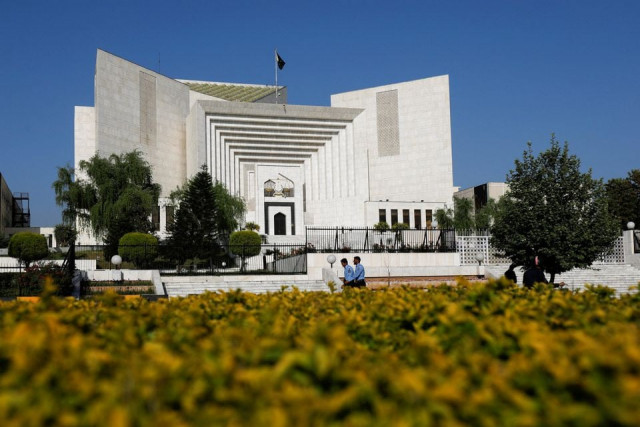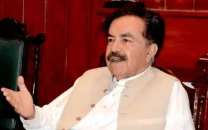Acrimony among SC judges intensifies
According to sources, the chasm between two sections of the SC judges has deepened

Attorney General for Pakistan (AGP) Mansoor Awan has expressed disappointment over the Supreme Court's decision to suspend implementation of a piece of legislation regarding the chief justice of Pakistan's (CJP) discretionary powers without hearing him.
“It is quite disappointing the way this case proceeded,” said AGP Awan with reference to the case taken up on Thursday by an eight-judge bench of the Supreme Court.
The bench which was hearing petitions filed against the Supreme Court (Practice and Procedure) Bill, 2023 — a law which curtails the top judge’s powers to initiate suo motu proceedings and constitute benches on his own -– on Thursday suspended implementation of the law.
The AGP said there was a clear impression that the case would be heard during the next week, for which notices were being issued.
“A twelve-member bench in the Aitzaz Ahsan case has held that the operation of a law cannot be suspended. And this judgment has consistently been followed by the courts. However, the settled jurisprudence has been disregarded in the most unusual manner," the AGP added.
According to sources, the chasm between two sections of the SC judges has deepened and things are now moving beyond the point of no return. They said the senior most judges of the apex court exchanged harsh words at Justice of Pakistan Umar Ata Bandial’s chamber on Thursday.
They revealed that after the Judicial Commission of Pakistan (JCP) meeting in which the JCP approved nomination of Justice Musarrat Hilali as the chief justice of the Peshawar High Court, CJP Bandial asked Justice Qazi Faez Isa, Justice Sardar Tariq Masood, Justice Ijazul Ahsan and Justice Syed Mansoor Ali Shah to come to his chamber.
During their discussion both the sides exchanged harsh words. Subsequently, three judges left the chief justice’s chamber. The sources also said that a retired judge attempted to make reconciliation but in vain.
Read Executive on the warpath with judiciary
According to a lawyer, the situation is getting worse and anything can happen as this infighting intensifies. However, he said, the federal government has no legal option to deal with CJP Bandial and his section.
The Supreme Court Rules as well as a couple of the SC judgements have given unfettered discretionary powers to the CJP. Nothing can be done easily as he has the advantage to make a pre-emptive strike like suspending the legislation regarding regularization of his discretionary powers..
Presently one section of the SC is being supported by the Pakistan Tehreek-e-Insaf (PTI) party and while the other is backed by the ruling coalition.
It is being witnessed that the superior bars are also divided and their representatives are not in position to play the role of arbitrators. Lawyers are urging the CJP that as the head of the institution he should show flexibility for survival of the institution.
It is learnt that no effort has for far been taken to cool down the situation. The CJP is ignoring senior judges in formation of larger benches hearing politically sensitive matters.
One lawyer believes that things have moved toward a “judicial anarchy” but it is premature to say which side will prevail in the end.
Commenting on the crisis, former additional attorney general Tariq Mahmood Khokhar said it was “the Sajjad Shah moment” on a larger scale. “The Supreme Court is falling apart,” he said.
"The motives of those involved are not believed to be coincident with the interests of the apex court; the Constitution and justice and democracy.
“Ironically, an unaccountable institution is proceeding towards a sacrificial accountability entailing the loss of some of its members as the only solution. Its fallout may well embrace the Constitution, the rule of law, parliamentary democracy and stability of the federation," he added.
Sajjad Shah was the 13th Chief Justice of Pakistan who faced a mutiny of judges and was subsequently removed.



















COMMENTS
Comments are moderated and generally will be posted if they are on-topic and not abusive.
For more information, please see our Comments FAQ